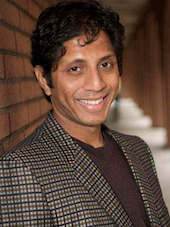Computer Speech Project To Boost Doctor-Patient Communication
SC CTSI-supported study helps create a computerized speech translation system to be used in clinics and hospitals.
A program funded by USCs Clinical Translational Science Institute is helping create a computerized speech translation system to be used in clinics and hospitals to bolster communication between physicians and patients.
Led by Shrikanth Narayanan, PhD, of the USC Viterbi School of Engineering, the SpeechLinks Project team includes two researchers from the Keck School, professors Win May and Lourdes Baezconde-Garbanati. SpeechLinks, a speech-to-speech translation system for clinics and hospitals, is designed to translate between English and Spanish. In practice, doctor and patient are connected by two headsets to a computer that performs the translation in near real time.

The system is designed to learn from its encounters, referring tougher translation problems to a human translator who can review the entire conversation and fill in the gaps where the machine is having trouble translating. The doctor may also elect to refer the conversation to a human translator if necessary.
While their colleagues at the Viterbi School develop the technical infrastructure for the system, May and Baezconde-Garbanati draw on their medical and cultural experience to develop test cases with which to train the system. As May notes, In translation, if you dont understand the cultural context, the translation may not be as effective as you want it to be.
Baezconde-Garbanati described their role as developing alternative culturally relevant scenarios, to test the system, including important cultural values and variations in cases and disease conditions. As she explained, this is the first study of its kind in the United Statesone that deals with the Spanish-speaking population. In developing the Spanish vocabulary of the system, they are attempting to build a culturally intelligent tool.
Both hope that this system can help assist overburdened interpreters in public health systems like Los Angeles Countys, or in remote areas without access to interpreters. Baezconde-Garbanati, who studies the role of culture in health behaviors, said, Competent current interpreters are maxed out in terms of the demand. Leaving simultaneous interpretation to family members, janitors in the hallway, or children is a thing of the past [SpeechLinks] could help them make decisions regarding where to send their precious resources.
Original text was published on The Weekly



